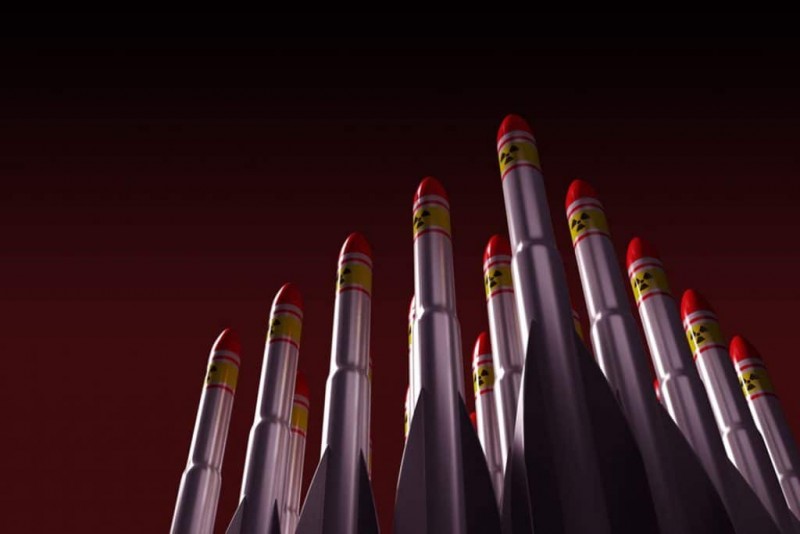Will Justin Trudeau respect the will of Canadians on banning nuclear weapons?

Nuclear weapons remain a serious threat to humanity and the Treaty on the Prohibition of Nuclear Weapons (TPNW) represents an important step toward abolishing them. Image courtesy of Shutterstock.
According to the Bulletin of the Atomic Scientists’ Doomsday clock, we are 100 seconds from midnight. Midnight signals the end of the world; we have never been closer, according to the acclaimed Bulletin. How could this be? The Cold War that threatened to spill into a nuclear exchange between NATO and the Warsaw Pact is long past.
Nuclear weapons and the threat they pose have been pushed out of the spotlight by the end of the Cold War, the climate crisis and, more recently, the pandemic. The result? As Angela Kane, the former UN High Representative for Disarmament and Undersecretary General starkly put it: “The arms control architecture which constituted a strong pillar of strategic stability even in the highly rivalrous Cold War environment has crumbled.”
In reality, the nuclear threat has not receded: it has grown. We witness today rising tensions between “the West” and Russia in eastern Europe and between the United States and China in the South China Sea. Meanwhile, arms control treaties have lapsed, or soon will. George W. Bush abrogated the Anti-Ballistic Missile Treaty. Then the disastrous Trump administration dismantled much of what remained of the international efforts to prevent nuclear war, such as the Open Skies Treaty and the Intermediate Nuclear Forces Agreement.
Despite the unwarranted lower profile of the nuclear threat, some important steps toward the elimination of nuclear weapons have been taken. The most important is the coming into force of the Treaty on the Prohibition of Nuclear Weapons (TPNW) in January 2021. Remarkably, 86 United Nations members have signed and 59 ratified the TPNW. The treaty prohibits the development, possession, stationing, use or threat to use nuclear weapons.
As crucial as the treaty is, none of the current states that possess nuclear weapons has signed on to it. Nor has Canada, which falsely claims that it is incompatible with membership in NATO. The idea that signing the TPNW is incompatible with NATO membership has been debunked by extensive analysis by Harvard Law School and the International Campaign to Abolish Nuclear Weapons (ICAN).
The dissenters appear to view the treaty as a waste of time and as a challenge to the Nuclear Non-proliferation Treaty (NPT). The NPT has been largely successful in preventing the spread of nuclear weapons but it has failed in its larger goal. The NPT supposedly commits nuclear signatories to engage in negotiations and to pursue policies leading to the elimination of their nuclear stockpiles. Lamentably none of the current nuclear powers, including notably the P5 (the United States, Russia, China, France and the United Kingdom) has taken any meaningful steps in this direction. The P5 recently released a statement highlighting the dangers of nuclear weapons and affirming their desire to never use these weapons. Yet, they are continuing to modernize and expand their nuclear arsenals.
While the TPNW will not have the immediate result of getting nuclear powers to dismantle their arsenals either, like the treaties to ban the use of chemical and biological weapons, landmines and torture, its intent is to delegitimize these instruments of state power.
Canada, which is not a nuclear power, nonetheless has a long history of cooperation with the US on nuclear issues, going back to the Manhattan Project. However, it is supposed to be a democracy responsive to the will of its citizens. According to an April 2021 Nanos poll, the vast majority (74 percent) of Canadians support Canada becoming a signatory to the TPNW. Doubtless, the Trudeau government is leery of alienating the Biden administration by expressing any interest in the TPNW. Nevertheless, the poll indicated the same level of support even in the face of US pressure not to sign.
It is time for Justin Trudeau to show the same courage as his father, who championed nuclear disarmament in his final years in power. The Canadian government has options short of signing on to the TPNW. A strong positive signal would be for Canada to attend the first Conference of the State Parties to the TPNW, scheduled for this coming March, as an observer. This is the approach that the new German government under Olaf Scholtz and the government of Norway, both NATO members, have adopted.
Observer status would signal the Canadian government’s respect for the goals of the treaty—the abolition of nuclear weapons—while imposing no obligations or commitments. Why wouldn’t the Government of Canada attend? We must demand they do.
Arnd Jurgensen’s research has focused on the political economy of the global south, especially Latin America. He has taught at several Universities in Canada and in faculties ranging from applied sciences and engineering to interdisciplinary studies. He is currently doing research and teaching courses on international politics at the University of Toronto. He has been involved in environmental activism for decades and until the recent shut down, was active in the Toronto music scene, performing regularly in venues around town.

